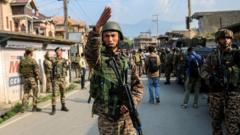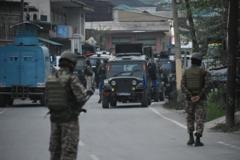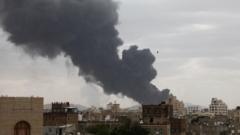India has launched significant air strikes on multiple sites across Pakistan, provoking a strong response from Islamabad and escalating tensions in the region. Experts speculate on the likelihood of Pakistani retaliation and the diplomatic measures necessary to de-escalate the conflict.
Escalating Tensions: Implications of India's Recent Air Strikes on Pakistan

Escalating Tensions: Implications of India's Recent Air Strikes on Pakistan
India's overnight airstrikes targeting militant positions in Pakistan have raised questions about potential retaliatory actions from Islamabad and broader regional implications.
In a dramatic overnight operation, India reportedly launched airstrikes targeting nine sites in Pakistan and Pakistan-administered Kashmir, claiming to have acted on "credible intelligence" related to militant positions. This high-stakes military action took place in a swift timeframe of 25 minutes, highlighting a sudden escalation in already fraught India-Pakistan relations.
Pakistan, in response, asserted that it had successfully shot down five Indian fighter jets and a drone, which remained unconfirmed by India. Islamabad reported significant casualties, claiming 26 deaths and 46 injuries resulting from the strikes, while Indian military channels said that Pakistani shelling claimed the lives of 10 civilians on their side of the de facto border. This incident follows a deadly militant attack on Indian tourists in Pahalgam, further stoking tensions between the two nuclear-armed rivals.
Experts dissect whether these airstrikes represent an unprecedented escalation in conflict. Unlike previous instances where India focused its strikes exclusively on Pakistan-administered Kashmir, this broader operation signals a change in strategy. As noted by historian Srinath Raghavan, India struck deep into Pakistan’s Punjab region, targeting the terrorist infrastructure related to groups such as Lashkar-e-Taiba and Jaish-e-Mohammed.
Ajay Bisaria, a former Indian high commissioner to Pakistan, describes these actions as a "Balakot plus response," aimed at establishing a renewed deterrent without promoting further escalation. Indian military sources emphasize the need to "re-establish deterrence," reminiscent of Israel's military doctrine of calculated retaliatory strikes. Experts warn against the risks of escalation; the prominent fear is that such reprisals could lead to a broader military conflict.
The consensus among analysts indicates that a Pakistani response is almost certain, however, managing this escalation will demand effective diplomacy to prevent an outbreak of larger hostilities. Some Pakistan-based experts suggest that retaliatory strikes are expected as the military is under public pressure to act decisively, especially with increasing anti-India sentiments.
Political perceptions within Pakistan further complicate the situation. Umer Farooq, an analyst in Islamabad, points out that the military's popularity has waned following recent political turmoil but could be rehabilitated through a strong response against perceived aggressors. This sentiment is echoed by Dr. Hussain, who warns that an escalating standoff may provide the military an opportunity to recapture public support.
As tensions mount, both nations are exercising a delicate balance of retaliatory actions and diplomatic efforts. Following the recent strikes, India has moved quickly to restrict commerce and interactions with Pakistan, further elevating tensions. Historical precedents illustrate that previous escalations have eventually dissolved through diplomatic intervention, emphasizing the critical need for communication channels to remain operative in preventing a wider conflict.
The current situation represents one of the most precarious moments in India-Pakistan relations since 2002, with experts pondering the potential fallout should cooler heads not prevail. Would restraint on both sides allow a cooling-off period, or will the cycle of retaliation escalate to more dangerous heights?





















